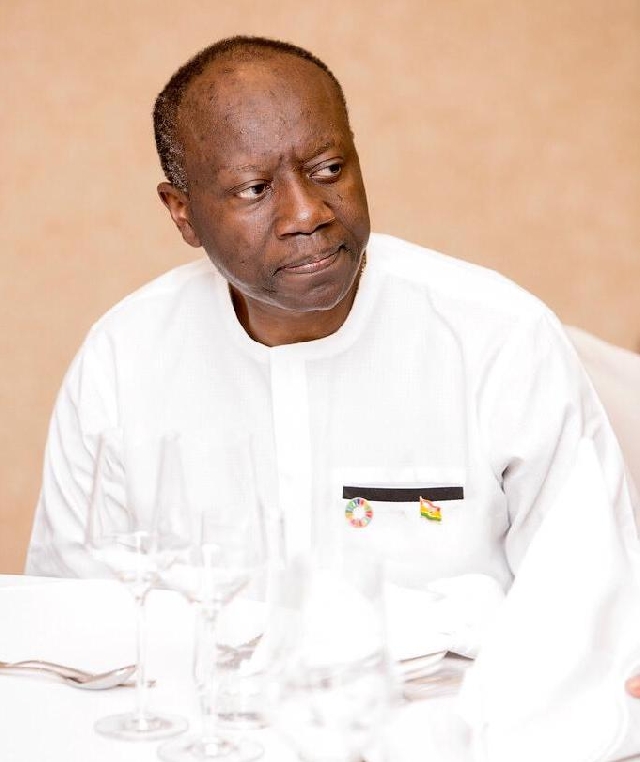Ghana’s ‘debt crisis alarming’: we’re borrowing to consume, service debts not for productive investment – Sam Jonah
 Ken Ofori-Atta is Ghana's finance minister
Ken Ofori-Atta is Ghana's finance minister
Sir Sam Jonah has said the state of Ghana’s economy and prospects keep him up at night, pointing out that the country keeps borrowing for consumption and debt-servicing rather than investing in productive ventures.
In a speech to Rotarians in Accra titled ‘Down the up escalator – Reflections on Ghana’s future by a senior citizen’, the executive chairman of Jonah Capital, an equity fund based in Johannesburg, South Africa, said: “I will start off by talking about that which concerns, or ought to concern all of us, and that which keeps me awake at night. And it is about the state of the economy and its prospects going forward”.
As an investor, he noted, “I know what an economy should look like to attract the necessary investment for national development”.
Available data, he quoted, “indicates that for the first quarter of 2020, GDP grew at a rate of 4.6%, contracted to -3.2% for the second quarter and -1.1% for the third quarter, giving an average outturn of 0.2% for the three quarters of the year”.
For the same period in 2019, Mr Jonah said “the economy grew at the rate of 6%. At the end of the third quarter, the industry sector contracted at -3.1% while services grew at 1.9%”.
“Only the agriculture sector”, he observed, “increased in its growth rate recording 4.5% at the end of the third quarter as compared to 3.7% for the same period in 2019”.
“This is telling us something, right? Even though government revenue exceeded the revised target for the year, expenditure also exceeded the revised target leading to the end of year fiscal deficit of 11.7% of GDP”, he pointed out.
He said: “One of the most alarming aspects of our macroeconomic situation is the debt crisis”.
As of the end of 2020, total public debt reached GHC 291.6 billion representing 76.1% of GDP, Mr Jonah said, adding: “A nominal increase of about GHC 149.3 Billion since January 2017”.
In 2018, he said “the debt-to-GDP ratio was 59.1%, increased to 62.4% in 2019 and to 76.1% in 2020”.
“New bonds have since been issued. The domestic debt component is 51.4% of total debt while external debt is 48.6%”, he said.
“Of course, we all know the effect this has on access to credit by the private sector for investment. But the bigger question is how all these debts are going to be repaid”, he wondered.
This question, Mr Jonah insisted, “is important because if you look at our expenditure profile, the top two items are the emoluments of government employees and interest payments on existing debts”.
“Thus, we are borrowing to consume and to service existing debts rather than for productive investment”, he indicated.
In 2020, he said “the emoluments of government employees represented 28.3% of total expenditure while interest payments amounted to 24.6% of total expenditure” while “capital expenditure was only 12.1% of total expenditure in 2020”, adding: “And this is not abating soon”.
“In fact, in 2021, the budget estimates indicate that interest payments will exceed even emoluments of government employees to become the number one line item in our expenditure profile”.
“This is why some economists argue that the ratio of debt servicing capacity to debt stock is a better measure of sustainability than debt-to-GDP ratio. But this is another discussion for another day”.
Source: Classfmonline.com
Trending Business

Debt restructuring and gold purchase drive Ghana’s credit upgrade by S&P
01:56
UNDP, stakeholders develop Ghana’s disaster management and risk finance strategy framework
15:50
NPA hosts second downstream compliance workshop to strengthen petroleum sector standards
11:23
GFZA CEO tours Tema Free Zone Enterprises to strengthen strategic partnerships
11:05
Finance Minister vows lasting economic stability and lower food prices in meeting with FABAG
08:46
Bawumia’s Gold for Reserve Programme is anchoring the Cedi – Kofi Bentil
13:27
DVLA opens new office in Adentan, CEO expresses gratitude to all stakeholders
08:27
President Mahama delivers on 24-hour economy promise within first 120 days
01:34
Gov't inaugurates task force to oversee establishment of Ghana’s national airline
13:57
NPA boss heaps praise on Finance Minister and BoG for stabilising Cedi, fuel prices
11:18




